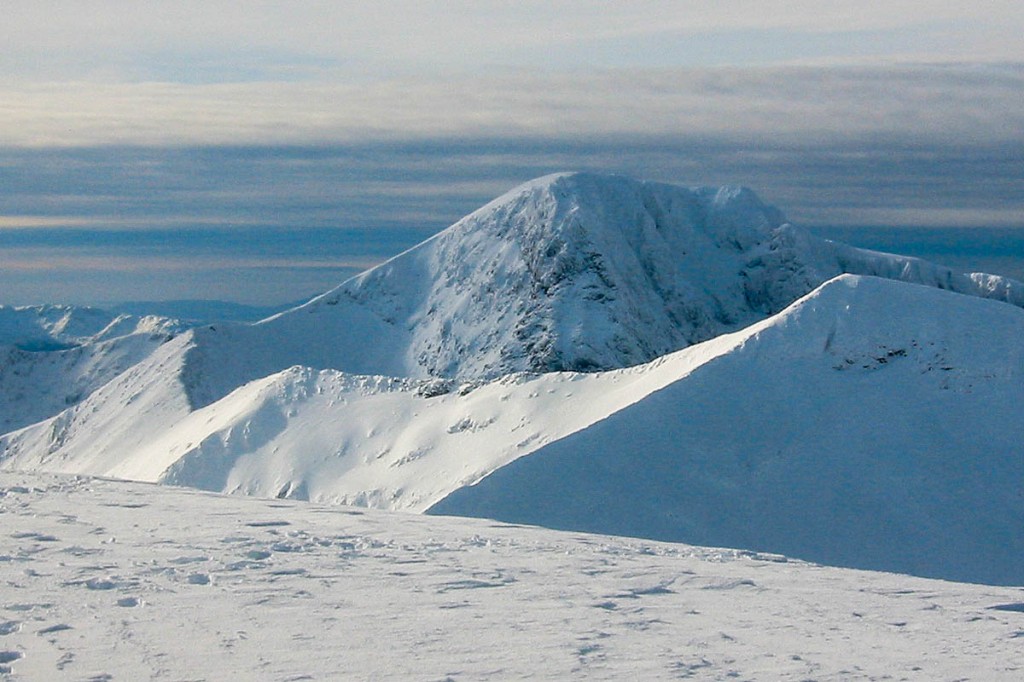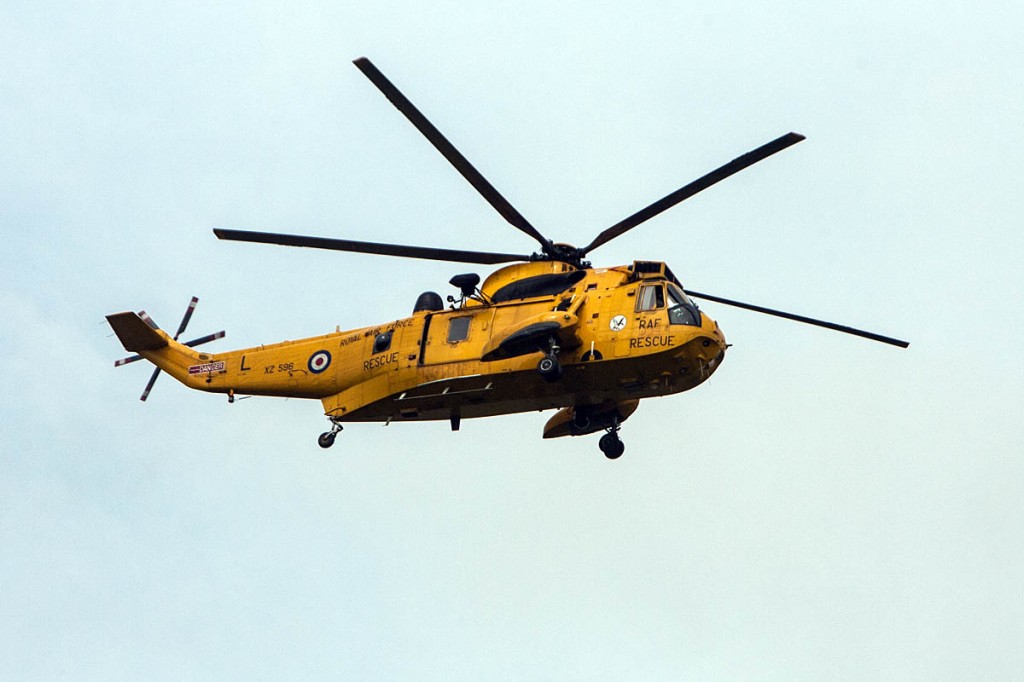Mountain rescuers put their lives on the line to rescue a group of inexperienced hillwalkers on Britain’s highest mountain after three of the men fell more than 600ft.
Lochaber Mountain Rescue Team said much of their gear was also trashed in a major operation to rescue four walkers on Ben Nevis yesterday.
The protracted rescue involved 26 of the team’s volunteers working in conditions of high avalanche risk. The operation was made more difficult by the walkers’ refusal to stay put as instructed, resulting in two of them falling more than 200m after their companion had tumbled a similar distance in Coire Eòghainn on the south side of the 1,344m (4,409ft) mountain.
The team’s leader John Stevenson publicly thanked his members and the crew of an RAF Sea King helicopter from Lossiemouth who were crucial in the rescue. Conditions on the mountain yesterday were extremely difficult and dangerous, the Lochaber team said.
The avalanche risk was at the highest level normally encountered in Scotland, with conditions worsening through the day and avalanches and collapsing cornices forecast.
A team statement said: “Everyone involved last night put in a major effort in horrendous conditions to assist casualties who did not make our job any easier.
“Conditions made navigation very difficult and communications were very poor. We had located the casualties using a phone app. We knew that one had fallen but the others could hear his shouts so we knew once we had located the others we would be able to get to the one who had fallen.
“One decided to try and walk out and by a stroke of luck was found wandering over the summit plateau by a mountain guide who we asked to walk the guy off. In the meantime the two guys at the point we had located with the phone app decided to move down towards their mate who was still shouting.
“We told them again to stay where they were but they obviously knew better and carried on which resulted in both of them falling down over the crags at the head of Coire Eòghainn.
“They both fell 200m-plus past their mate who was stuck on some steep nasty ground. Luckily they both escaped with minor injuries, probably due to the amount of snow cushioning their landings over the steep ground.”
The Lochaber team said its members could not find the two men at the location they thought they were, so spent a lot of time trying to locate exactly where they were. “The only clue was loud shouting from the casualty below,” the team spokesperson said. The team then set up multiple abseils to try and locate the casualties over ‘very difficult ground and iffy anchors’. “Lots of gear was abandoned on the abseils plus 300m of rope trashed was trashed,” the spokesperson said.
A group of team members who had been dropped at base of the corrie had by this time climbed up and located the two men who had fallen furthest. They were then walked down to a location where the RAF Sea King could pick them up.
The spokesperson said: “Two of the guys climbed up to the more seriously injured casualty and packaged him up while the team from above came down. Multiple lowers later they managed to get the guy down the side of the waterslide to the roadside where he was taken to the Belford Hospital.
“Rescue 137 [the Sea King crew] also needs a special mention, as conditions made flying to pick up the two casualties from the lip of the corrie very much at the limit.
“They reluctantly decided after this to return to their base. We are extremely grateful for the assistance we received as without them we would still be out there and the outcome may not have been same. Hopefully this is not their last visit to Lochaber before the Sea Kings are mothballed on 1 April. Bristow have a hard act to follow.
“Everyone on the hill and flying were putting their lives on the line for frankly some very inexperienced hillwalkers who were not equipped for a winter mountaineering expedition.
“We do not normally criticise casualties as 99.9 per cent of the rescues we do are for well equipped, experienced walkers and climbers who have had an unfortunate incident outside their control. We are all mountaineers ourselves and what we do is for our own community who benefit hugely from the money generated by outdoor sports in Lochaber.
“However, a line was probably crossed last night which made the risks a little less palatable for both the team and the RAF.
“However, before anyone jumps on the bandwagon and bleats that we should be charging for rescues, by introducing charges you would need a professional rescue service which just in the Lochaber area alone would cost the public purse millions of pounds to cover, never mind the rest of Scotland. Where do you draw the line? Do you charge a rugby player with an injury for the NHS cost of treating them?
“In Scotland, we have a world-class mountain rescue service which is on par, if not better than some of the professional rescue services elsewhere in the world, delivered at a minimal cost to the taxpayer, which provides a service for one of the largest participant sports in the UK.
“Many of the remote communities mountain rescue teams operate out of in Scotland depend on the spend of mountain sports to survive and we do not want to take money away from them through some dubious insurance scheme.
“We are seeing major challenges to mountain rescue, particularly in the Highlands, with the introduction of a single police force and the privatisation of the search and rescue helicopter service which is making our role more complicated than it need be.
“We are also concerned about potential dilution of funds which were originally being earmarked for mountain rescue being diverted to other areas which are not technically mountain rescue, albeit as important.
“With the police having to make budget savings there is a risk that some of the roles they have traditionally covered now being farmed out to mountain rescue teams, particularly in the lowland setting which is putting the allocation for the teams that operate in the remote mountainous regions at risk.”
Lochaber MRT said after a brief break for breakfast after the rescue concluded early in the morning, its volunteers set out for their daytime jobs.


Ariadne
26 February 2015Refreshingly frank and honest.
Charging for mountain rescue isn't the way forward in the UK but I hope these hillwalkers see fit to undergo proper training and perhaps do some substantial fundraising.
Are MRTs able to encourage rescued parties to give a donation in recognition of their rescue? It ought to be possible, with the correct approach and wording.
;
26 February 2015I have nothing but great gratitude for the rescue teams and raf whom coordinated and excuted the operation brilliantly resulting in our safety.
However the media again has totally exaggerated the situation building lies to make the story more interesting
Ian512
26 February 2015Perhaps they could manage a charity walk around a park local to their home, with the money raised going to the Lochaber Team.
Commercial interests and governing bodies seem to be in a dilemma between heavily promoting the activity as a sport, while at the same time having to regularly remind people that it is, in fact, a very dangerous activity.
As Reinhold Messner wrote: "I go to the wild mountains where I am responsible for myself. Step by step I am making sure that I don't die. Climbing is an adventure, not a sport, all mountains are dangerous."
TH
26 February 2015The Charity Organisation should bear some responsibility for this. I hope they donate to MRT.
Tramcar
26 February 2015Shouldn't there be more prominence of this incident given by BBC down south? So many of these rescues are for English groups who clearly have no idea of the weather conditions being experienced on Scottish mountains.
Kevin Noon
26 February 2015If not charging why not insist people have insurance to cover such eventualities, as in Austria, Switzerland etc.
paul hunter
26 February 2015All I can say say is thank God for MRT across the UK
Gizasmum
26 February 2015It's been stated that these people were ill equipped and inexperienced, but I've also read that they were members of a CLIMBING club. What's it to be? I suspect that 'climbing' was just a comment made by an ill-informed journo, since climbing involves ropes, etc., and the wherewithal to use the associated equipment. More likely they were a walking club, NOT even a HILLwalking club, and the most they ever normally do is a nice sedentary local walk along paths and canals in their local area. I am an experienced Scottish winter hillwalker, equipped with and knowing how to use crampons and ice axe. I have climbed many Munros and Corbetts, but I would never have dreamt of doing what they did in those (or forecast) conditions. These people should be named and shamed. They are lucky to be alive and should have no qualms whatsoever about making a seriously hefty donation to Lochaber MRT.
Thunder
26 February 2015@Kevin Noon: Various reasons: a) An insurance scheme is still charging - the team would then have to cost a rescue and issue an invoice to the insurance company (which might challenge it, at which point the lawyers could become involved and then we might as well all go home). b) Where do you draw the line between a rescue for which insurance is required and, for example, a lowland incident for which it would be unreasonable to expect people to be insured? The Lake District team of which I was a member for a number of years regularly assisted the ambulance service. The Alpine teams don't operate in the lowlands. c) What would happen if you reached a casualty and found s/he had no insurance?
But, honestly, a charity ascent of Ben Nevis in February? The charity involved should certainly have some questions to answer.
Jhimmy
27 February 2015One of the simplest methods for large charity climbs is for them to hire professional guides who would advise, assist, station themselves on blackspots etc. If a walker has a problem, they would phone the guide instead of MRT.
The guide/s would be paid and probably get future clients if any walkers enjoy themselves.
Mark
02 March 2015Tramcar wrote
"Shouldn't there be more prominence of this incident given by BBC down south? So many of these rescues are for English groups who clearly have no idea of the weather conditions being experienced on Scottish mountains."
You sure about this or is are your personal prejudices showing through? Please feel free to elaborate.
Anon
31 August 2015"I have nothing but great gratitude for the rescue teams and raf whom coordinated and excuted the operation brilliantly resulting in our safety.
However the media again has totally exaggerated the situation building lies to make the story more interesting"
No they haven't. Please explain your comment or put your tail between your legs.
Anon
31 August 2015Actually Mark it's nothing to do with "personal predjudices". People from the south of England generally have absolutely no clue about mountains or what to do. Frankly a lot of them think they're just going for a walk. This may be anecdotal but it is the experience of many of us here in Lochaber.